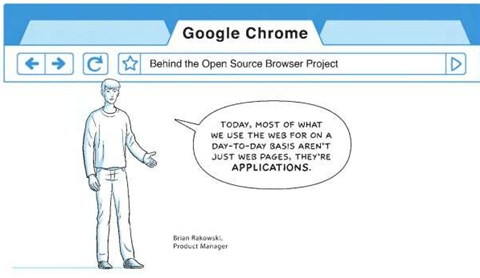Google Chrome: The enterprise playbook

Google is launching a Web browser dubbed Chrome in a move that's garnering a lot of attention--because it conveniently fits with the Microsoft vs. Google plotline--but how much should businesses pay attention to this move?
First a quick recap (Techmeme), Google will launch the Chrome browser and it has some interesting bells and whistles, security features and raises questions about its role vs. IE and Firefox. As Nick Carr notes the big picture is that Google is adding a browser to upgrade capabilities across the board to make it more cloud friendly. Carr reckons that the applications are the message.
Dennis Howlett adds that no CXO (any C-level exec) is going to give Chrome all that much thought since it's a beta and it's unclear how Google's browser fits in the enterprise. However, CXO types may want to pay a little more attention than Dennis' recommended nano-second. Why? You'll wind up supporting Chrome (probably indirectly)--along with all those other Google apps the search giant is sneaking into your enterprise. The upshot: CXOs may actually have to read a comic book about Chrome after a long weekend.
There has been a lot of talk on the Enterprise Irregular list and the consensus seems to be that Google will make a splash for two months or so and then developers will see what the catch is with Chrome. From there we'll find out if Google's Chrome browser is worth much.
In sum, the tech executive playbook is to hang back, download the browser, take it for a spin and monitor closely. After all, your employees will download Chrome and it's just a matter of time before it gets attacked just like IE and Mozilla does daily. What will Google's patching system look like? The Techmeme crowd hasn't pondered that point yet. Bottom line you can't afford to NOT pay attention to Chrome even if it's insignificant to your business because it's likely to be a security risk.
However, there is a bigger question here. How much do you want to rely on Google for your business? For smaller businesses, Google Apps and its collection of software in the cloud may be a no-brainer. As companies grow though the Google equation gets murkier. CapGemini sums up the view of Google you need to ponder.
Everyone has a rather strong opinion on the monopoly Microsoft has/ had on the desktop. Microsoft is/ was evil since it pushes Windows media player via windows, since it pushes Internet Explorer via Windows, leaving the desktop user no other chance than using these functionalities. Same goes for Microsoft’s Office suite, which doesn’t support ODF natively (it does since July 2007 via an add-in) and saves documents default in the proprietary .doc format.
Well that said, Microsoft may not be on the good guys side, however is there a good guys side at all? Fan boys now would jump on their chairs and would chant “Google, Google, Google!” however is Google really not evil as they stated? Google is evil, Google has a hidden agenda and that is not strange....
Fact is that Google already hosts your email, calendar, RSS reader, web history, documents, photos, blogs and much more free functionality. It is quite clear Google knows what you are doing since you do it with their applications. It is always questionable if you should want to outsource that many of your applications to one provider. However Google stated that it is not evil and therefore you should not mind it.
The point: Google is tying browsing, your personal history, your apps and your data together. And Google will couple these parts with Android, which is likely to link your PC and phone together. Is this playbook all that different than what Microsoft's? Simply put, maybe everyone is evil.
Your business is increasingly being to cast its lot with one provider whether it be Microsoft, Oracle, SAP or someone else. You can add Google to that mix in the future. It's all in the name of standardization and having one throat to choke. Sounds great, but portfolio management dictates that you want to be wary. And once you add up this healthy skepticism about Google's business objectives you find it has a distinct disadvantage. Google is the devil you don't know. Microsoft and your other app providers are known commodities. Bottom line: Technology execs shouldn't get carried away with the Chrome chatter, but do pay attention. Google is still in the process of revealing itself and that's valuable information going forward.
